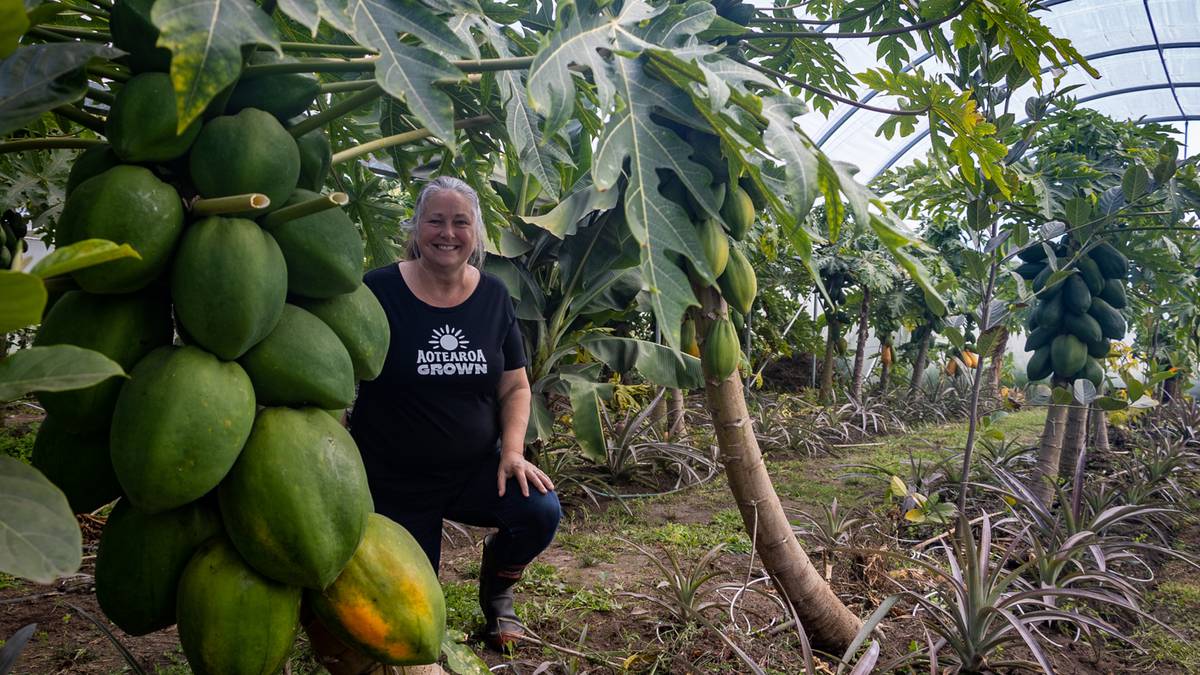Sara Bennett of Aotearoa Grown with her commercial crop of tropical papayas. Photo / Donna Russell
Five different varieties of commercially grown tropical papaya fruit are ripening at a Waipu property in Northland and will soon be sent around New Zealand to fulfil fruit box orders.
Aotearoa Grown owner Sara Bennett
can step into the tropics, subtropics or temperate zones all in one day at her property.
Large greenhouses with six-metre-high bays have been set up to recreate the perfect climates for different types of exotic fruits, and the results so far are encouraging.
Sara is revelling in the change of lifestyle from her previous career in the health sector and is looking forward to further developing her growing exotic fruit business.
Aotearoa Grown is not just her fruit. Other fruit growers with a similar world view are joining the brand as well.
“We are really passionate about tropical fruit, and I wanted to start a business that is responsive to climate change. We think Northland is the perfect place for a tropical fruit bowl,” she said.
The 5.7-hectare property had previously been used for grazing before she moved there three years ago.
Since then, as well as building the greenhouses, about 1400 native plants have been planted, and she has plans to continue planting about 2000 plants a year to create a sheltered paradise for local birdlife, as well as enhancing the warm microclimate within.
“Our biggest enemy is cold,” she said.
Stepping into the tropical zone greenhouse immediately triggers memories of travels to the steamy heat of Asia.
“I get the cheapest trip to the tropics each day,” Sara said with a grin. “I am used to the heat, but I keep a careful eye on visitors, who can feel a bit giddy if they are in here too long.”
/cloudfront-ap-southeast-2.images.arcpublishing.com/nzme/A6EF4WL5XI6IC6ADCWWZWX2HTI.jpg)
Papaya are interplanted with starfruit, mamey sapote and abiu. The starfruit has provided its first crop of fruit, which Sara said were “huge, sweet and juicy”.
Towering banana palms droop with hands of bananas. The tropical zone allows varieties of bananas that would not normally survive in Northland.
“We’re growing a wide variety, including some Dwarf Red bananas that have red skins and taste like a mix of raspberry and vanilla. They are divine,” Sara said.
In the subtropical zone greenhouse, rows contain experimental crops of jackfruit trees – known as the largest tree fruit in the world. The pebbled skin of the jackfruit looks similar to durian fruit, but its smell is not offensive; more like sweet chewing gum. Sara’s trees are too young to fruit yet.
She is also growing sweet tamarind trees, babaco, cherimoya, casimiroa, inga beans, figs and coffee plants.
Tropical cherries, lychee, longan fruit and mango trees are also flourishing. A chocolate sapote is a cousin of the persimmon tree, with fruit that tastes like chocolate pudding with a hint of citrus.
Giant granadilla vines are draped with lush foliage, exotic flowers and rugby ball-sized fruit. This cousin of passionfruit comes from the Caribbean.
Cinnamon trees are also shooting up, with colourful new leaves showing a tinge of red.
“You will often find new leaves on tropical plants have a red tinge to them. It’s their method of providing sun protection to the new growth.
“We don’t know yet what is going to do well here. There is a lot of research and development going on,” Sara said.
With the short seasons of the tropical fruit meaning having a constant supply is challenging, Sara has opted for fruit boxes that contain a variety of whatever is in season.
“We have spent a lot of time designing bespoke recycled cardboard boxes filled with wood wool and non-toxic print designs so that everything can be composted. That was very important to us.”
Sara said the response she’s already had about her new business has been encouraging.
“We’ve only had our online sales set up for a couple of months, and already we are selling everything we can produce.
“There are a lot of people in Aotearoa who have travelled overseas a lot or who have moved here and want their children to experience the tastes they have known.
“It’s incredibly heart-warming,” she said.
As well as online sales, Sara’s exotic offerings can often be found at the Waipu Roving Market. Visitors are not allowed on the property for safety reasons.




